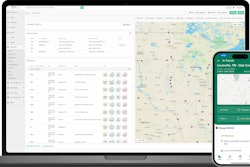Managing a fleet of any size can often seem like a monumental task, and the challenges only grow exponentially as the fleet expands, making efficient asset tracking and comprehensive data capturing a bit complicated. The key to overcoming these challenges, however, lies in the strategic use of integrated fleet management software (FMS) and solutions. These not only streamline data consolidation, they significantly enhance security management, mitigating risks associated with disparate software systems.
FMS and other integrated solutions work in the background to automatically collect, consolidate and aggregate data into configurable reports. Fleet managers can then utilize a customizable dashboard to keep priority metrics front and center. The ability to hide non-essential metrics reduces data overload, while visual representations, such as charts and graphs, surface patterns, trends and discrepancies.
The significance of data consolidation
Integrated fleet solutions play a starring role in data consolidation by seamlessly collecting disparate data from multiple sources, including data from GPS and telematics, fuel cards and other business and fleet solutions. The consolidation of this diverse data on a single platform simplifies data analysis and provides a holistic view of fleet operations.
Data aggregation, however, goes beyond the mere collection of data points; it involves summarizing data from multiple sources to increase the value of insights which are presented in up-to-date fleet reports. These reports, showcasing specific metrics, allow fleet managers to follow an audit trail to identify and address issues quickly. For example, a cost comparison by year report can surface insights into increased fuel consumption and spend as well as service expenses and downtime, helping fleets make informed decisions regarding asset performance and replacement.
Simplifying reporting and data sharing
FMS simplifies the often daunting task of creating fleet reports and sharing data. Reports in FMS can be tailored and filtered based on specific criteria, such as vehicles, groups or locations (for fleets with more than one home base). Additionally, managers can set up automated report deliveries to stakeholders of their choice at custom intervals, ensuring that relevant information reaches the right person precisely when needed. This seamless reporting mechanism not only saves time, it ensures that everyone in the decision-making chain is well-informed.
The automated approach integrated FMS provides not only eliminates manual data entry errors — not to mention the time manual data entry takes — it also accelerates the analysis process, providing real-time data access. Fleet managers can use data analytics to uncover patterns, identify trends and derive actionable insights, fostering informed decision-making and optimized resource allocation.
Prioritizing data security
Despite the benefits digital solutions offer, data security remains a top concern for companies implementing new technologies, and fleet management is no exception. The wealth of available fleet technologies has introduced myriad opportunities for optimization but has also raised security concerns, and as technology evolves, so do cybersecurity threats. Integrated FMS incorporates robust security practices to adapt to these ever-changing threats.
Addressing the weakest link in cybersecurity — user credentials — reduces the likelihood of unauthorized access and mitigates potential risks. Single sign-on (SSO) frameworks are a key security feature in FMS, providing increased usability and reducing the risk of compromised credentials. This is particularly significant in fleet operations where multiple solutions are in use. Implementing an FMS with SSO not only enhances security, it also simplifies user authentication and reduces the burden on IT staff.
Adjustable user permissions also play a key role in data security by restricting unauthorized access. Managers can finely tune permissions in FMS based on roles and responsibilities at the individual level, ensuring that individuals have access only to the data and functionalities relevant to their roles. This granular control enhances data security and minimizes the risk of internal breaches.
Consistent software updates and backups improve data security as well. Security vulnerabilities often arise from outdated software versions. Integrated solutions facilitate consistent software updates and data backups without you needing to lift a finger. This ensures that your FMS is fortified with the latest security patches, protecting against potential risks.
The strategic adoption of integrated solutions, such as FMS, not only consolidates disparate data for improved insights, it also serves as a robust security management tool. The features of SSO, adjustable user permissions and consistent software updates collectively contribute to a secure and streamlined fleet management ecosystem, all while surfacing costly and time consuming issues.










